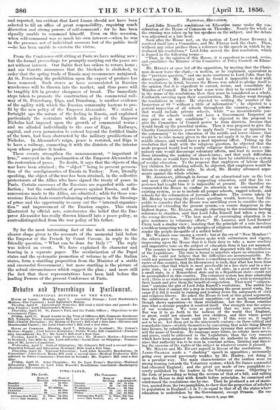From the Conference still sitting at Paris we have nothing
new ; but the formal proceedings for promptly carrying out the peace are not without interest. Our Baltic fleet has orders to return home ; and our Gazette announces that the blockade is abolished, in order that the spring trade of Russia may recommence uninjured. At St. Petersburg the prohibition upon the export of produce has been removed. Such stores as have accumulated in Russian warehouses will be thrown into the market, and thus peace will be tangibly felt in greater cheapness of bread. The immediate steps taken to promote the construction of the commercial rail- way of St. Petersburg, Riga, and Diinabarg, is another evidence of the agility with which the Russian community hastens to pro- fit by the new policy of the Emperor Alexander. We stated a fortnight ago the nature of the feeling in Russia, and explained particularly the restraints which the policy of the Emperor Nicholas had imposed upon the growth of commercial towns ; and we alluded individually to the case of Riga. Railways, capital, and even permission to extend beyond the fortified limits of the town, had been obstructed by the military predilections of Nicholas. In Alexander's reign, peace is restored, and Riga is to have a railway, connecting it with the districts of the interior upon whose produce it trades.
These events strengthen the announcement, "important if true," conveyed in the proclamation of the Emperor Alexander on the restoration of peace. No doubt, it says that the objects of the war have been attained ; the " object " being to prevent persecu- tion of the coreligionaries of Russia in Turkey. Now, literally speaking, the object of the war has been attained, in the collective protectorate of the Allies who have signed the treaty of peace in Faris. Certain successes of the Russians are regarded with satis- faction; but the combination of powers against Russia, and the concessions made to the Allies, are admitted ; while for those con- cessions Russia finds counterbalancing advantages in the blessings of 'Awe and the opportunity to carry out the "internal organiza- tion" and improvement of the Russian empire. This strain illustrated by official acts, corroborates the belief that the Em- peror Alexander has really thrown himself into a peace policy, as contradistinguished from the war policy of his father.


























 Previous page
Previous page